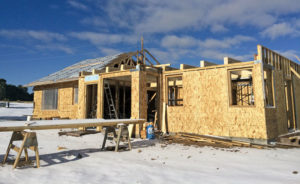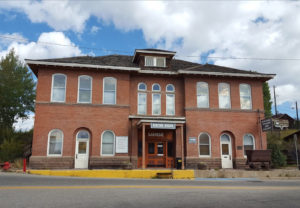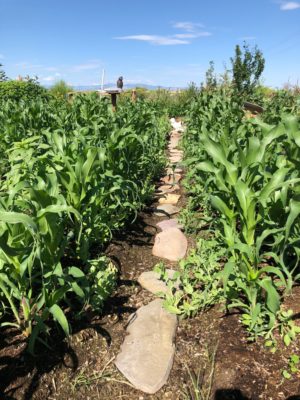By Peter Anderson
What follows is the opening chapter of a mystery-in-progress set in a fictional San Luis Valley town that may bear some resemblance to the town where I live.
Ray followed the road through some cottonwoods and crossed the bridge over the Gonaway River. It had been almost twenty years since he and Boone had fished the Gonaway down to some wetlands known as the Sinks, where the river went underground. Now, as he followed the river upstream into town, he passed the marquis in front of a Pentacostal church – “Don’t Give Up, Moses was a Basketcase too” – and rolled slowly downtown after passing a sign that said, “Welcome to Chimera, Colorado,” and then another that said, “15 mph Please – Children and other Residents at play.” A purple-robed man walked out of the post office. Ray guessed he may have been a monk at the Buddhist center south of town. There was also a Catholic monastery out that way too.
The northern edge of Big Sands National Park, about ten miles south of Greater Chimera, was one of the quietest locations in the country. It made sense that monkish types wanted to be on the edge of all that stillness, but what about the rest of the local population? He wondered what kept them here as he drove past the C-Mart – Groceries & Hardware, Shangri-La Realty, The Warm Flow Café and Natural Food Emporium, Café Mud, Walt’s Taxidermy – “We carry maps and fishing supplies” – Millie Moreno-Certified Public Accountant, Free Spirit Liquors, and The Golden Lotus: Metaphysical books, crystals, Tarot readings, tattoos, piercing and pipes, a veritable cornucopia for local hipsters and occult aficionados.
[InContentAdTwo]
He wasn’t sure why anyone else was living in this end-of-the-road-town, but at least he had some notion of why he had come. It had been less than a week since he had received a letter from a lawyer informing him that he had inherited his Uncle Boone’s cabin. He had lived in Laramie for thirty years – married there, raised a son and daughter, made some good friends, served as head of the English Department at the University of Wyoming. But Sally and Ben were grown up and settled now; one on each coast. Jane had gone south to Tucson after their divorce. Most of his best faculty friends had retired and moved on.
After the divorce, he’d sold the only house he’d ever owned and moved into an apartment a few blocks from the library. He rarely spent time with anyone on campus. Darlene, his favorite graduate student, had taken her Wranglers, and all the wonders they contained, back to Cody. He sure didn’t want to linger as if turned out to graze on the big campus lawn they called Prexy’s Pasture. So when he wasn’t working in his library cubicle – the only place he could seal himself off from the usual distractions of working at home – he mostly spent time with Doug, his wide load of a yellow lab, walking up in the wide open Laramie hills east of town or in the piney shadows of the Snowy Range country off to the south and west. At least he no longer had to worry about grading or faculty meetings. Finally, he had the time he needed to write, only he hadn’t written a page in six months.
He pulled up by the hitching post in front of The Roadkill Saloon, which was housed in a two-story false front complete with a balcony and railing over which hung a black “Don’t Tread on Me” banner with a yellow sidewinder coiled and ready to strike. He parked next to a Harley and got out of the truck ready to shake off the road with a drink or two. He let Doug out, who sniffed around, found the right spot and marked some territory, after which he started barking at some hounds running loose down the street. “Mind your manners,” Ray said. He opened the door of the truck and Doug hopped back in. “I’ll be back shortly.”
The bar was pleasantly cavernous. Waylon Jennings was singing “Dreaming My Dreams.” There were two others sitting by themselves at the bar who turned toward him when he walked in and then turned back to their drinks. To his right, an old man with a beat up straw hat and mutton chop sideburns was shaking some salt into a Budweiser. To his left, a young man with shaved head and sandals sipped on a glass of red wine and studied a book spread out on the bar. He could play the conversation either way or just keep it straight ahead with the bartender who was cleaning glasses and whose name, according to the back of her hand-tooled belt, was Dale. She had a long white ponytail. Her baggy sweatshirt revealed the vague outline of some curves, but her rear end was so flat it was a wonder her pants didn’t fall to the ground under the weight of an enormous ring of keys. Were there that many doors in Chimera?
It was a small town. There were other small towns down valley where Spanish might still be heard as much or more than English, but Chimera wasn’t one of them. Chimera was its own kind of place. Unlike many of the settlements further south, agricultural communities established by the first wave of settlers who had come into the region from Mexico and Spain, Chimera began as a freewheeling mining camp. Historically, the place had a more eclectic population. It still did. New waves of settlers – mavericks, mystics, and other misfits like his Uncle Boone, had come to Chimera looking for some elbow room in an end-of-the-road mountain town surrounded by thousands of acres of public land.
Having lived in Wyoming for almost forty years, Ray could appreciate that. He’d gotten used to living with a big horizon. Earlier that day, as the valley had opened out south of Poncha Pass, and as he drove by ranch houses sheltered by islands of cottonwood trees and some irrigated alfalfa fields, through the town of Arboleda (garage and general store), and past an unexpected cluster of doublewides and a scrappy bunch of shacks and sheds; all of which were surrounded by miles and miles of rabbitbrush and little else, he felt more at home. Further south, he drove through Broomtail – church, coffee shop, and the high school which had a sign that said “Home of the Mustangs.” Just south of town he found the turn-off to Chimera: “Gas, Food, and Lodging – 12 miles.” Below that, a cardboard sign read: “No Gas. Pump is Down.” He had checked his gauge – three quarters full, good enough – flipped on his blinker, and turned onto County Road XX. “Dos Equis,” he would later learn, is what the locals called it. He drove past the Fool’s Gold Rock Shop, an unfortunate name, he thought, making the unlikely prospect of selling rocks from such an isolated outpost even less likely. And he followed the road east toward the snow-dusted peaks of the Sangre de Cristos.
Living in Laramie, the sky was so wide, you could just about see the curve to it. But here … this precipitous wall of mountains, the poor man’s Tetons, as his Uncle Boone had often called them, were a formidable presence on the eastern horizon, inhabiting space that belonged to the sky in Laramie. Was that why he felt uneasy? Or was it just that he was headed into a strange town?
In the Roadkill, Ray ordered a Budweiser and a shot of Wild Turkey. The place had a roadhouse kind of feel to it. Just enough daylight came in through a window near the front door. Dale set the drinks down on a piney bar that had been knicked, grooved and initialed. Ray assumed that this was a slow afternoon. He wondered who might turn out on a busy night and scanned the place for clues. In between the big mirrors that reflected rows of bottles, largely whiskey and tequila, was the portrait of a mining era whorehouse queen. Above the popcorn machine was a hand-written sign, “We Sell and Service Hangovers,” and below that another that said, “Damn Good Menudo and Green Chile, $2.50 a Bowl.” He was hungry, but not hungry enough to trust a bowl of green chile at a place called The Roadkill.
Then he noticed the bulletin board. It was tucked away in a corner beyond the taps that offered a few domestic brews and a couple of Colorado micros. He scanned the flyers. Yoga lessons. Tai Chi retreats. Recycling pick up dates. An announcement for a UFO seminar. The one that caught his attention was the photograph of a middle-aged man, maybe in his late fifties, with a shaved head and various rings and studs hooked through his ears and nose. “Musta been a rough fishin’ trip,” his Uncle Boone would have said. Apparently, it had only been a few weeks since this guy had gone missing.
“What do people do here?” he asked Dale.
“They disappear,” Dale said, turning her attention to some unpaid bar tabs. Simple question, simple answer. Or maybe not, but Ray knew enough about small town bars not to follow up with another question right away. Besides Dale probably owned the big hog parked out front and looked tough enough to have ridden with the Sons of Silence. Better to stay on her good side. Ray took a sip of Wild Turkey, savored the heat sliding off his tongue down his gullet, and chased it with a cool pull off a longneck Bud.
His gaze returned to the gone missing photo. Ray was tempted to ask about this guy who had apparently disappeared in the mountains east of town, but everyone at the bar seemed happy enough in their reveries. Dale was still busy with her barroom accounting. So he kept to himself and looked out the window, watching the last wave of sunlight leave the top of a steep ridge.
He knew he needed something different, if not strange, to lift him out of his doldrums. Being on the road helped. It often had. In this new place, mostly new at least since he had been to visit a few times over the years … he thought he might reinvent a routine that had become, well, maybe a little too routine. Then again, he might also be “pulling a geographical,” as suggested by a drinking buddy back in Laramie: “You can change your seat at the table, Ray, but you still gotta play the same old cards.”?
Peter Anderson lives in Crestone, Colorado, and teaches writing at Adams State University.



